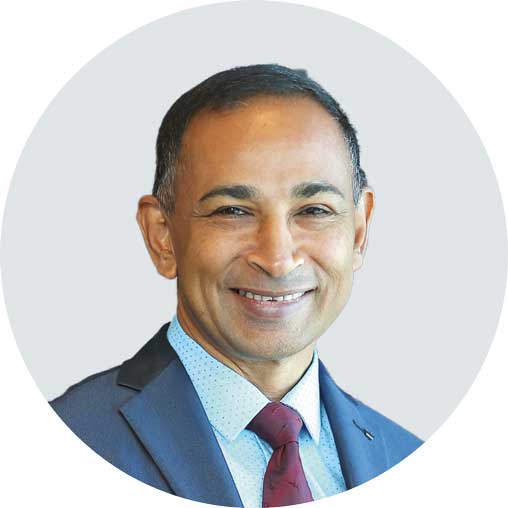THE PUBLIC TRUST
Developing greater trust
Sriyan de Silva Wijeyeratne
Employees’ Trust Fund Board
Q: How did your enterprise react to the economic tumult of COVID-19?
 During the initial confusion due to the pandemic, several government services and organisations shut down except for essential services. Despite not being an essential service, the Employees’ Trust Fund Board (ETF) realised its importance during the crisis; people needed the money and so we were one of the few nonessential state services that didn’t shut down.
During the initial confusion due to the pandemic, several government services and organisations shut down except for essential services. Despite not being an essential service, the Employees’ Trust Fund Board (ETF) realised its importance during the crisis; people needed the money and so we were one of the few nonessential state services that didn’t shut down.
We worked in shifts and arranged transport for our people. Thanks to their amazing commitment, we disbursed around Rs. 1 billion during the peak of the shutdown for the public’s economic relief.
There were issues with efficiency due to physical distancing measures and limited staff but we ensured that we’d maintain a continuous service.
The disbursement of money required addressing numerous factors including collections, electronic payment processes and remote working.
We also waived several hundred million rupees of penalties for organisations that were struggling to pay their ETF on time.
Moreover, we extended an amnesty scheme of sorts so many organisations were able to operate within comfortable payment timelines.
Q: What role does the ETF play in the national economy?
The ETF plays a critical role in the national economy – at August last year, according to an official report, the ETF had become the most profitable state owned enterprise (SOE) in the country, which is a milestone for our committed and dedicated team, who are always cognisant of their role and service to the country.
As Sri Lanka’s second largest fund, we operate as a crucial social safety net for the people. In addition, there are other social benefits such as scholarships, loans and medical cover for members.
If good leaders and efficient boards are appointed and given a free hand, SOEs can flourish and become quite effective.
Q: So what strategies have you put in place to expand services?
In spite of the crisis, we were able to implement certain initiatives such as technology into how the ETF operates and provides services.
Currently, more than half our funds are collected through online direct debits and we hope to make this mandatory in the future. We have also facilitated trade payments and various other services through regional locations, which help broad base our footprint.
We’re currently building a major tech platform with the Information and Communication Technology Agency (ICTA), which we hope will transform our work in the future.
In addition, we have been reducing much of the backlog on fund allocations and strengthening the team with good appointments while improving our physical infrastructure. In essence, we are strengthening on several fronts.
There has been a lot of talk regarding e-governance; and while we’re a long way from it, we have already taken steps to install the appropriate IT infrastructure to enable staff to join the work from home (WFH) movement if the need arises.
 This includes distributing laptops and training in IT so that staff need not come into office to ensure the continued provision of services. Unfortunately, there are many paper-based processes within government so gradual transformation will be the order of the day.
This includes distributing laptops and training in IT so that staff need not come into office to ensure the continued provision of services. Unfortunately, there are many paper-based processes within government so gradual transformation will be the order of the day.
Q: And what steps have been taken to improve efficiency?
When I was appointed, my private sector background was intended to improve the efficiency of the ETF. I was given a mandate in this regard and am grateful for this freedom. As a result, I haven’t needed to hire staff to fulfil any political motives.
The team has also been quite dynamic and supportive. As such, we’ve not increased our headcount and we hope to streamline further in the future. This optimisation will enhance efficiency and productivity.




